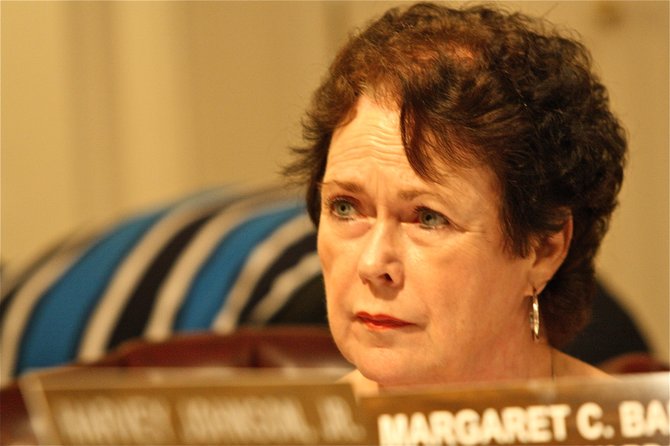Ward 7 Councilwoman Margaret Barrett-Simon has fought for the Fortification Street renewal for years. Now she is setting her sights on drainage problems in the Ward. Photo by Jacob Fuller.
JACKSON — Margaret Barrett-Simon has governed from City Hall longer than most Jacksonians can remember, and in that time, the infrastructure of her ward has seen little revitalization.
The Ward 7 Councilwoman first took office on the City Council in 1985. Since then, she has served as the president and vice president of the council, and chairwoman of nearly every committee.
The graduate of the University of Southern Mississippi and mother of five hasn't, however, seen many improvements to the aging infrastructure of her ward, which runs along the west side of Interstate 55, from Meadowbrook Road in the north just past Elton Road in the south.
For years, Barrett-Simon has pushed to have the city repave Fortification Street, a vital entrance into the city from the interstate. Plans for that street's facelift are finally underway, and construction began this week.
The JFP sat down with Barrett-Simon in her City Hall office July 16 to talk about infrastructure and other issues in Ward 7.
What is your next infrastructure priority in Ward 7?
Certainly, (my priority) is to get this project done, and drainage. Every infrastructure need is very obvious in Ward 7. We've got the oldest of everything, from one end of town to the other. That's a huge challenge.
Our drainage situation seems to be getting worse, not better. I don't know whether that's because we're having new building construction that's going on that is causing more runoff. Our infrastructure and our streets are the oldest in the city. That continues to be the challenge. I would say drainage and streets.
Where, specifically, have you seen the drainage problems?
Most everywhere in Ward 7. Last year, the area behind the old McRae's, Choctaw Road, that completely filled, overflowed and went up into houses there. That's gone on for a number of years.
Over on Pleasant Avenue, where Town Creek comes through, this last horrible rain we had, it would be worth your time to just go over there and just at how high the water came. I've been over there when we've had fireman and boats come in. The water would have been over my head.
In the Belhaven area in the last few weeks, we have had houses (and) cars flooded. I mean, it looked like you could have done white-water rafting in the photos that were taken.
We had a meeting at Belhaven College the other night with Midtown and Belhaven Heights. Some of the stories are shocking. They said in Belhaven, they were lucky not to have lost a life. In fact, several good Samaritans went to the aid of someone who really was in terrible trouble.
Then, in midtown, around Millsaps Avenue, where Habitat (for Humanity) has done a number of houses, and other areas of midtown, if we have a big rain like we had last week, the streets just absolutely rise to the front doors of places and flooded many of them. So because of the aging infrastructure, we've got real problems all over the city, but especially in the older areas.
What is the answer to how you get the funding and get that fixed?
That's our challenge right now. I'm sorry we're doing this interview just as the new budget is getting ready to come out, because anything I say today, in a few weeks won't then be in discussion, and we'll be debating what the administration has brought forward.
I hope (with) this increase in sales tax and few other belt-tightening measures that we've done here that we will identify funds for some of the real needs in the city, but we've got to have some help from our legislature. As you know, our federal funding, which helped so much with infrastructure, drainage (and) roadways, that's not a viable option right now. So we have a lot of challenges.
Most major hospitals in the city are in Ward 7. How do you expect new health-care laws, and in particular Medicare and Medicaid, to affect the economy in the Ward?
I think that the hospitals are going to have a tough time here, because so many of our people are uninsured. As far as jumping into that debate right now, I think that the state leadership and hospitals and their organizations need to come together and figure out what is the best way. But I can't imagine, with the number of uninsured, poverty-level individuals and families that we have in the state, that (not insuring everyone) would be at all good for the bottom line of our hospitals.
With the new health-care laws, will it help once everyone is insured?
I would think so, but we've got to wait and see what our state leaders are going to do, and they've said, as of this morning, that they're not doing anything about this until the new legislature is seated and this election is over. That will be next year.
I think it's premature for me, at the local level, to be making decisions here, because I'm ultimately not the one that's going to make the decision. You asked me how I thought it would impact the institutions that are in this ward. I think it will have a serious impact. As of this moment, I have not sat down with any of the administrations of the hospitals to talk about this issue.
A few months ago, at your request, the council moved work sessions from 10 a.m. to 4 p.m. Was that was because of your conflict with the board at the Mississippi Sports Hall of Fame?
Y’all just listen to whatever this little (Clarion Ledger reporter) Brain Eason says? I said that was one of (the reasons). He really does feed y’all, I’m telling you.
One, we have had this meeting at 4 o’clock for years. It was abruptly changed because one of the clerks, or several of the clerks in the office, said they wanted it changed, one of whom is not here anymore.
This is supposed to be a part-time job, so we make other commitments that will not interfere. I had signed on to a year’s commitment on this (Sports Hall of Fame) board. It’s a very important board. It’s one of the major attractions in the state of Mississippi. People from all over the world come here. I take those responsibilities seriously. I’ve never done board work—the Salvation Army, the school of liberal arts at Jackson State. I could go on and on and on with boards and commission that I have served on, but I always made sure that they didn’t interfere with my council work.
Well, we abruptly changed it. My problem was not that biggest consideration. We get, usually after work on Friday, the Council agenda for the following week. People are usually busy on Friday. We usually have a lot of commitments, city-type commitments, over the weekend. We have Sunday, which is a family day and church day, and we usually have other commitments then. Then, we would meet back here at 10 o’clock on Monday morning. That’s what they wanted.
Well, our city employees said they were losing their time, too, because they had to be back here at 10 o’clock. Also, if you had Monday, I’ve always been able to get questions answered that I need answered so I understand something that may be puzzling to me on the agenda. Well, we’d taken all that time away. Once we saw that the very people that were voting for this were the very ones that weren’t showing up.
This (Hall of Fame) board that was written about in February meets once a month. The bigger thing was the fact that there was no time for the staff to prepare. They had rush around getting their agenda items in by Wednesday. The agenda gets to us by Friday evening, and that’s usually after work. Then you have to be here at 10 o’clock in the morning. It was total inefficiency.
You see that we have a quorum now that it’s moved back to 4 o’clock. The proofs in the pudding.




Comments